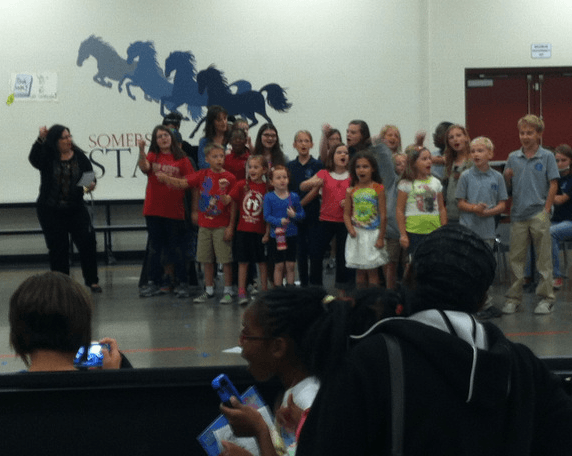A Nevada public charter school apologized to a sixth grade student for censoring her from using Bible verse in a school PowerPoint presentation, according to the Liberty Institute, the North Texas-based religious liberties law firm which has represented the family involved in the matter.
Twelve year old Mackenzie Fraiser attends Somerset Academy in North Las Vegas and was told by her teacher in February that she could not use the New Testament passage John 3:16 for the assigned “All About Me” project, which had to include an “inspirational saying” according to documentation provided by the Liberty Institute.
When the girl’s father, Tim, a pastor, learned about the situation in late April, he contacted the school. Then, he received a letter from Assistant Principal Jenyan Martinez advising him that when Mackenzie submitted the project “the matter became one of having a captive audience that would be subject to her religious beliefs,” which was her understanding would violate US Department of Education (USDE) policy.
Other banned scripture identified was “Bible verses or quotations from the Book of Mormon” according to a demand letter authored by Liberty Institute Senior Counsel Jeremy Dys on Wednesday, May 20, in which the firm sought an apology from Somerset Academy for the youngster. They gave school officials 10 days to redress the project to avoid legal action.
Despite the principal’s interpretation of USDE policy, Dys cited in his letter that “it is a bedrock constitutional principle that students retain First Amendment freedoms while at school…Private student speech, such as student class assignments, is protected by the Constitution and the government must remain neutral toward the private expression of religion by students.”
Also, Dys wrote, “While it may be tempting to censor student speech in the name of protecting students from exposure to religion, the First Amendment ‘does not license government to treat religion and those who teach or practice it, simply by their status as such, as subversive of American ideals and therefore subject to unique disabilities.’”
Moreover, Dys underscored that the US Department of Education (USDE) “affirmed this longstanding position of neutrality toward the free exercise of religion by students – including such expression as part of a student’s written or oral classroom assignments…”
Fraiser had the constitutional right to express her beliefs about religion in a homework, artwork, and other written and oral assignments free from discrimination based on the religious content of their submissions.
“Such home and classroom work should be judged by ordinary academic standards of substance and relevance and against other legitimate pedagogical concerns identified by the school. Thus, if a teacher’s assignment involves writing a poem, the work of a student who submits a poem in the form of a prayer (for example, a psalm) should be judged on the basis of academic standards (such as literary quality) and neither penalized nor rewarded on account of its religious content,” Dys continued.
He also stated, “We are unaware of any decision by the Supreme Court of the United States, any other federal or state court, or the United States Department of Education preventing a student from expressing her religious beliefs as part of a student assignment on the ground that a ‘captive audience . . . would be subject to her religious beliefs.’ Contrary to Assistant Principal Martinez’s incorrect—and unlawful—assumption, when a student speaks within the classroom, her speech does not automatically become government speech. Decades of Supreme Court jurisprudence and the United States Department of Education guidelines come to precisely the opposite conclusion: absent other factors not present in this situation, student assignments constitute private student speech that cannot be censored by school officials (teachers, administrators, etc.) based on the religious content of their submissions.”
Dys then noted that what happened to Fraiser “is this very danger of chilling private student speech that the Supreme Court of the United States has rejected when protecting private expression by students.”
Two days later, a letter of apology from Somerset Academy followed on Friday, May 22 in which they acknowledged that the teacher and the public charter school administrator “acted in good faith at all times” but they were wrong.
School board chair Cody Noble wrote, “After reviewing the facts of this particular situation, Somerset Academy recognizes that the teacher and assistant principal incorrectly implemented those guidelines. Expression of a student’s religious beliefs in the form of homework, artwork, and other written or oral assignments is protected speech and should have been allowed in this instance.”
Noble continued, “We respect the civil liberties of our students and their parents. We endeavor to strike the correct balance between two basis and equally important obligations imposed on public school officials by the First Amendment: honoring students’ right to express their personal religious views, while not endorsing any particular religious activity or doctrine.”
Dys joined the Fraiser family in front of the federal courthouse on Wednesday to tell Mackenzie’s story and was “very pleased” with the outcome. Liberty Institute works on cases like this all over the country and in this instance said it was “good that the issue of religious liberty has been reinforced.”
Follow Merrill Hope on Twitter @OutOfTheBoxMom.

COMMENTS
Please let us know if you're having issues with commenting.